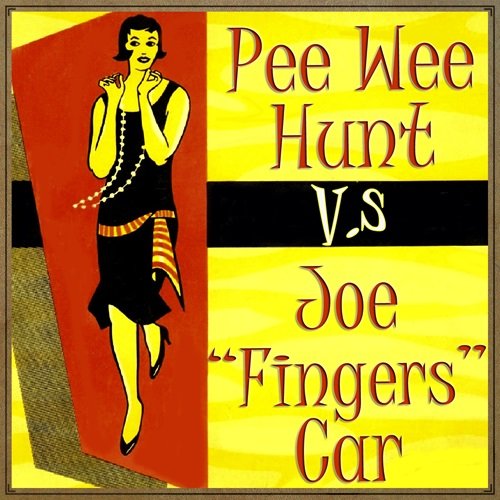Pee Wee Hunt:
In 1948, trombonist Pee Wee Hunt and his band were fooling around at a Capitol recording session. They performed a satirical version of "Twelfth Street Rag" that found them playing like amateur Dixielanders and renegades of 1921-style jazz. The Capitol executives were delighted, the performance was released, and to everyone's surprise, it became a major hit! Prior to that spontaneous performance, Hunt had been best-known for his long period with the Casa Loma Orchestra. His father had been a violinist and his mother a guitarist, so music was a natural part of his life. Hunt was actually a banjoist originally; he started playing when he was 17. Soon he was doubling on trombone and playing in local bands on both instruments before eventually dropping the banjo. He was with Jean Goldkette's Orchestra for a period in Kansas City (1927-1928 after the Bix Beiderbecke period), worked with the Hollywood Theatre Orchestra in Detroit, and then in 1929 became one of the founders of the Casa Loma Orchestra, which would eventually be taken over by Glen Gray. Hunt had occasional trombone solos and was probably most notable for his good-humored (and sometimes comedic) vocals. He remained with the Casa Loma Orchestra for 14 years until departing in May 1943 to settle in Los Angeles. Hunt was a disc jockey for a time in Hollywood, served with the U.S. Merchant Marine, and in 1946, formed his own Dixieland group. The success of "Twelfth Street Rag" resulted in the trombonist recording many more dates for Capitol (up until 1962) although no further hits resulted. Pee Wee Hunt remained active into the '70s.
Joe "Fingers" Carr:
While heavily influenced by Art Tatum, this performer was hardly considered a heavyweight pianist during his career. Born Louis F. Bush, or Busch depending on the source, the keyboard maestro who would also make heavy use of the stage name of Joe "Fingers" Carr managed to make it into Leonard Feather's Encyclopedia of Jazz, but with the following disclaimer: "A novelty performer rather than a jazz artist." The novelty itself was a kind of heavily sexed-up ragtime piano style that caught on in the very dawn of the hi-fi era. The invention was in sharp contrast to lounge music and would most likely have the opposite effect than a seduction if played in a bachelor pad. Carr began driving his piano this way while working as an A&R man for Capitol. In a brainstorm based on a sharp analysis of current trends, he decided to sign himself up as the mysterious "Fingers."
He is yet another talent that the city of Louisville, KY, can claim as homegrown -- but when it was time to study formally, Carr, at that point still a growing Bush, headed for the Cincinnati Conservatory. This was not a performer whose professional career began after college graduation, by any means. The 12-year-old keyboardist headed up his own ensemble, Lou Bush's Tickletoe Four. By the age of 16 he had no further use for the old homestead and hit the road with the touring groups of bandleaders such as Clyde McCoy, Henry Busse, and George Olsen. He continued moving from one touring dance band to another throughout the '20s and '30s as if any sort of extended commitment was the ultimate hot potato. This period of his career came to a close in tandem with the death of bandleader Hal Kemp in 1941. The pianist had been touring with Kemp at the time; stranded in Los Angeles, he decided to settle there, then joined the Army from 1942 through 1945. He next emerged in the music business, as previously mentioned, in his role as a talent scout.
Dipping his fingers into a recording session from time to time, Carr was particularly effective providing an authentic instrumental ambience on the 1949 single entitled "Ragtime Cowboy Joe" by the duo of Jo Stafford and Paul Weston. The fact that this side became a big hit didn't help Carr's chances to convince his bosses of the commercial potential for an all-piano album in the same style. "Ivory Rag," the first single released from Carr's new series of recordings, turned into an international hit.
Quite a crew of honky tonk pianists followed suit in making records of this sort. Under Carr's name alone, a discography exists that rivals the work of the most prolific recording artist. The style he created was combined with every conceivable fad, including Spanish bullfight music. Inevitably, this led to public burnout. The pianist changed employers in the late '50s, moving over to Warner Bros., where his responsibilities shifted back to the A&R mode. His biggest success for this company was a series of comedy albums produced with comedian Allan Sherman. Bush died in a car accident, the unfortunate nature of this tragedy compounded by the fact that he had gotten so much mileage out of the name Carr. His marital history deserves a chapter by itself, with multiple wives including vocal diva Margaret Whiting.




